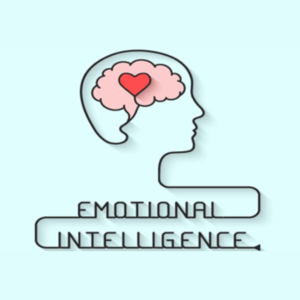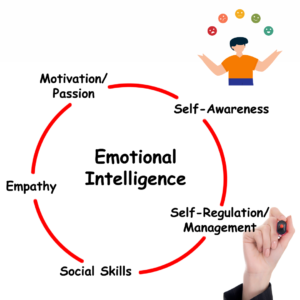Emotional intelligence (also known as EQ or emotional quotient) refers to the ability to recognize, understand, and manage your own emotions, as well as being able to understand and influence the emotions of others. It involves being aware that emotions drive behaviours’ and impact people either positively or negatively. Let’s explore more!

Signs of Emotional Intelligence:
- Identifying emotions: You can accurately identify and describe what people are feeling.
- Self-acceptance: You are aware of your personal strengths and limitations.
- Letting go of mistakes: You can move past errors and learn from them.
- Embracing change: You adapt well to new situations.
- Empathy and concern: You show sensitivity to others’ feelings.
- Taking responsibility: You accept responsibility for your mistakes.
- Managing emotions: You handle difficult situations with emotional control.
Measuring Emotional Intelligence:
Self-report tests: These are common and involve rating your own behaviors based on statements or questions.
Ability tests: These assess your skills by having you respond to situations, which are then evaluated by a third party. Two commonly used measures are:
Mayer-Salovey-Caruso Emotional Intelligence Test (MSCEIT): An ability-based test that assesses perception, identification, understanding, and management of emotions.
Emotional and Social Competence Inventory (ESCI): Based on ratings from people who know the individual, it evaluates emotional competencies.
Our emotions influence the decisions we make, the career path we take, the films and music we enjoy, the art we’re drawn to. Emotions help us choose our friends, those whom we fall in love and stay with for our entire lives, also those whom we’ll leave behind.

The four domains of Emotional Intelligence — self-awareness, self-management, social awareness, and relationship management — each can help a leader face any crisis with lower levels of stress, less emotional reactivity and fewer unintended consequences.
What is emotional maturity? Emotional maturity means having the self-control to manage your emotions and work to understand them. As an emotionally mature individual, you don’t view emotions as a weakness. Instead, you value them and don’t try to hide them.
Business Emotional Intelligence (EQ) is a practical, work-based approach to emotional intelligence that helps individuals and teams understand why people behave the way they do and how to maximize their engagement with, and performance at, work1. Let’s delve into the importance of emotional intelligence in the workplace and explore how it can benefit you and your team:
Components of Emotional Intelligence at Work:
Self-awareness: Recognizing and understanding your own emotions.
Self-regulation: Managing and controlling your emotions effectively.
Motivation: Staying driven and setting goals.
Empathy: Understanding and considering the feelings of others.
Social skills: Building and maintaining positive relationships with colleagues.
Why Investing in Emotional Intelligence Training is Essential
Emotional intelligence is the key to having a positive impact on your team and organization. It is foundational to developing people, teams, and cultures that can adapt and engage no matter what challenges are encountered.
In order to build a workforce that is resilient at all levels, organizations need to invest in emotional intelligence skills like training, collaboration, decision-making, conflict management, and motivation. This will ensure the organization has the trust, communication, and engagement that will allow people to perform at their best in any circumstance.
Stress Management: High EQ individuals can typically handle work-related stress better, navigating difficult moments more effectively.
Team Dynamics: Emotionally intelligent people foster better team cooperation, leading to improved productivity and performance.
Leadership: High EQ employees make better leaders by making decisions based on logic and facts rather than just emotions. They maintain a clear strategic vision for the organization and its members.
Remember, emotional intelligence plays a crucial role in successful communication, decision-making, and overall workplace well-being. Developing and practicing EQ can lead to greater success in various aspects of your professional life





Leave a Reply